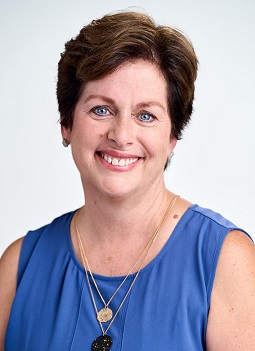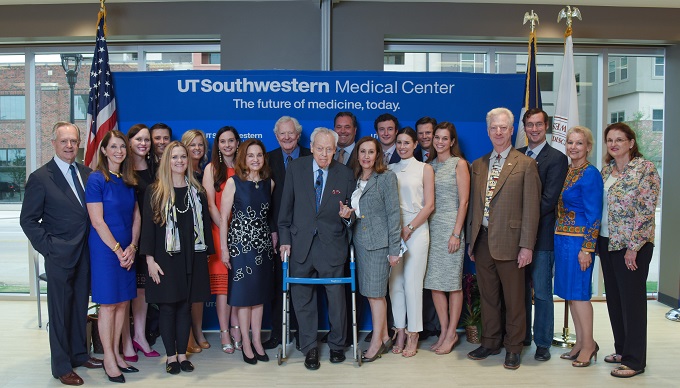Moncrief family gift furthers brain tumor research program

W.A. "Tex" Moncrief Jr.
By Sharon Reynolds
Thanks to gifts totaling $3.2 million from W.A. “Tex” Moncrief Jr. and affiliated family foundations, a collaborative research team at UT Southwestern’s Harold C. Simmons Comprehensive Cancer Center is testing new therapies that offer hope to those diagnosed with glioblastoma, an aggressive form of brain cancer. Dr. Elizabeth Maher, Director of UT Southwestern’s translational research program in neuro-oncology, is helping to lead the drive toward a cure for glioblastoma through the development of unique mouse models, made possible through this support.
UT Southwestern has shared an extraordinary partnership with the Moncrief family through the years. Their gifts have supported UT Southwestern buildings, programs, and a distinguished chair in Dallas, as well as enabled the growing clinical presence in Tarrant County through support of the UT Southwestern Moncrief Cancer Institute and the UT Southwestern Monty and Tex Moncrief Medical Center in Fort Worth. Their latest gift was made in honor of Tex’s son, Charlie, to initiate a unique mouse study that Dr. Maher and Mr. Moncrief have named the Charlie Moncrief Glioblastoma Mouse Program. The program brings promise of better treatments and survival rates for patients with glioblastoma.
“This transformational research will break down a major barrier in the search for effective treatments for glioblastoma by enabling Dr. Maher and her team to study basic mechanisms of tumor growth and to test new treatments through a new model system,” said W.A. “Tex” Moncrief Jr. “Our family is committed to making a significant positive impact in the world around us, and we are confident our gift to UT Southwestern can make a profound difference in the way glioblastoma is treated in the future.”

Dr. Elizabeth Maher
“This gift is a game changer in the search for a cure for glioblastoma. It provides an opportunity for our team to scale the mouse models program up to a level that will enable critically important scientific investigation on tumors derived directly from patients and provide a unique platform for testing new and promising treatments before they go into clinical trials,” said Dr. Maher, Professor of Internal Medicine and Neurology and Neurotherapeutics.
According to the National Cancer Institute, glioblastomas are the most common type of brain cancer in adults and remain one of the most challenging cancers to treat. There are more than 12,000 new cases each year in the U.S., and despite treatment with chemotherapy and radiotherapy, the median survival time is less than two years.
“This generous gift from the Moncrief family will help make advances in the biomedical understanding of glioblastoma tumors possible and pave the way for highly personalized treatments,” said Dr. Daniel K. Podolsky, President of UT Southwestern. “It will help build UT Southwestern’s existing program into the largest repository of mouse glioblastoma colonies in the world and facilitate drug discovery to cure glioblastoma and other brain tumors.”
Modeling human diseases in mice
When a patient is diagnosed with glioblastoma, surgeons can remove a tumor sample from the brain and study it for clues about what makes the tumor grow. However, once the tumor sample is used up, the opportunity for discovery ends.
Dr. Maher and the neuro-oncology team have developed a process to preserve the vital clues that are retained in the tumor by using the mouse as a vehicle to expand the number of tumor cells available for research. Dr. Robert Bachoo, Associate Professor of Neurology and Neurotherapeutics and Internal Medicine, and Dr. Bruce Mickey, Professor of Neurological Surgery, Otolaryngology – Head & Neck Surgery, and Radiation Oncology, joined forces to bring the science and the surgery together in a unique way.
With the patient’s permission, Dr. Mickey’s team removes a tiny piece of the tumor during surgery and hands it off to Dr. Bachoo’s team for rapid processing back in the laboratory. The goal is to expand the precious few cells from the patient into a colony of mice that harbor tumors with identifiable genetic and metabolic features that the patient tumor had. The goal for the team is to have a colony for each patient’s tumor to be able to identify unique and common features among the tumors.
“The biggest barriers in glioblastoma research have been lack of adequate human tumor samples to examine mechanisms of growth, spread in the brain, and resistance to therapy, plus the lack of faithful tumor models in which to test new drugs. These unique patient-derived mouse models provide a massive leap forward in all aspects of research and drug development,” Dr. Maher said.
Potential impact of research
The mouse colonies offer rich opportunities for scientific discovery by identifying the critical targets that are responsible for the unrelenting growth of glioblastoma. As the individual mouse models are generated, treated, and studied, insights will emerge that can inform personalized treatment decisions for patients. Moreover, this research can help to cure tumors at the time of diagnosis and prevent recurrence, which is the ultimate goal.
Having many mice with the exact same tumor enables physician-scientists to test treatments in the critical preclinical stage before launching a clinical trial; accelerates the pace of drug testing and decision-making on the selection of drugs to be advanced to clinical trials; and potentially engages pharmaceutical companies to bring new treatments for preclinical study, as well as other investigators around the world to partner with UT Southwestern to study the unique tumors and help develop treatments.

W.A. "Tex" Moncrief Jr. (middle) is surrounded by family at the UT Southwestern Monty and Tex Moncrief Medical Center in Fort Worth.
“We want patients with brain tumors to look to the future with confidence and hope, not fear, and to anticipate the precious milestones in their lives that will define their family’s legacy,” Dr. Maher said. “We are so grateful to the Moncrief family, who have partnered with us, to add the search for a glioblastoma cure to their family’s already incredible legacy.”
Dr. Bachoo holds the Miller Family Professorship in Neuro-Oncology.
Dr. Maher holds the Theodore H. Strauss Professorship in Neuro-Oncology.
Dr. Mickey holds the William Kemp Clark Chair of Neurological Surgery.
Dr. Podolsky holds the Philip O’Bryan Montgomery, Jr., M.D. Distinguished Presidential Chair in Academic Administration, and the Doris and Bryan Wildenthal Distinguished Chair in Medical Science.